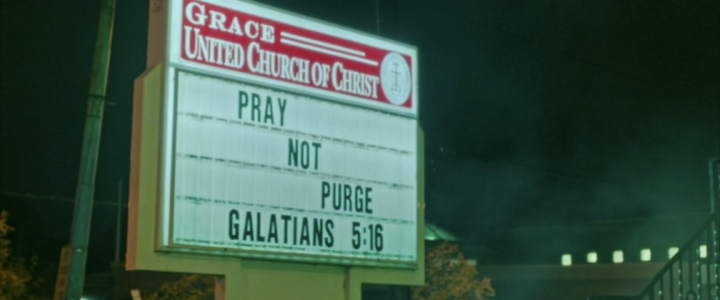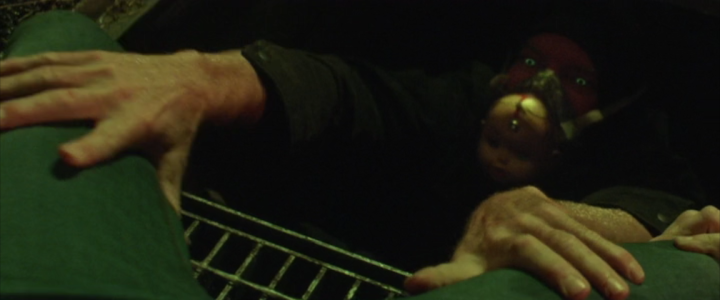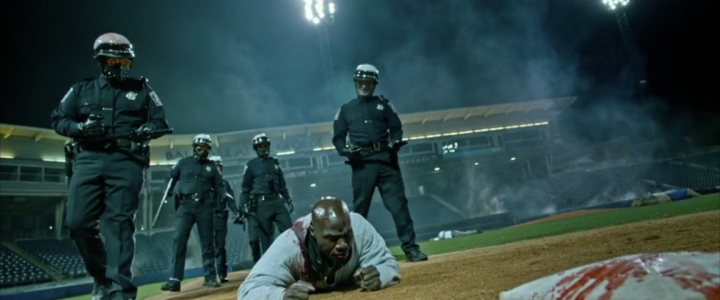The Purge. 2018. Directed by Gerard McMurray. Screenplay by James DeMonaco.
Starring Y’lan Noel, Lex Scott Davis, Joivan Wade, Mugga, Patch Darragh, Marisa Tomei, Luna Laure Velez, Kristen Solis, Rotimi Paul, Mo Mcrae, Jermel Howard, Siya, Christian Robinson, Steve Harris, & Derek Basco.
Platinum Dunes/Perfect World Pictures/Blumhouse Productions
Rated R. 98 minutes.
Action/Horror/Sci-Fi/Thriller
★★★★1/2
 From the beginning, The Purge franchise has been explicitly political. After the first movie, the series became more focused on the social aspects of its premise rather than simply being eerie action-horror. The initial story was about a bourgeois white family discovering exactly how America’s Purge affects others. The sequel touched on personal stories of those affected by the Purge, such as the various POC whose lives were irreparably changed by the nationwide policy. The third movie, while sticking with many themes from the second, took on more of the political madness inherent in the Purge.
From the beginning, The Purge franchise has been explicitly political. After the first movie, the series became more focused on the social aspects of its premise rather than simply being eerie action-horror. The initial story was about a bourgeois white family discovering exactly how America’s Purge affects others. The sequel touched on personal stories of those affected by the Purge, such as the various POC whose lives were irreparably changed by the nationwide policy. The third movie, while sticking with many themes from the second, took on more of the political madness inherent in the Purge.
We’ve arrived at The First Purge. This prequel takes the next logical step forward— while moving backwards in time— by examining all the ways race, class, and economy played a role in the creation of the New Founding Fathers of America political party, then the Purge itself. The core of this movie, and the entire franchise, is made up of Marxism, questions of morality, and the realisation of how inherent violence is to human nature. The fact the lead cast are made up mostly of black actors is a fantastic choice. Gerard McMurray and James DeMonaco aren’t demonising white people, they’re laying bare truths about how black communities (and other communities made up primarily of POC) have historically been first to suffer under policies created by their own government(s).
Why would the Purge be any different?
Amongst criticisms of classism and racism is the cold, hard fact that if people were allowed to do what they want in a lawless society, for one night or 365 days a year, the ugliest parts of society would emerge further. Because, as America’s proven over the last few years, the hatred displayed by straight white people towards anyone they see as Other is barely contained below the surface. Any encouragement of such hate—y’know, like a nation electing someone who proudly calls themselves a nationalist— will only allow it to fester and grow until it destroys what’s left of the country.

“We’ll do whatever it takes to let you dream again.”
 The American Purge is posed as a method of fixing society. They call it a “societal catharsis.” In reality, it’s a purging of useless or undesirable elements of society as deemed so by the N.F.F.A. The links to the Holocaust in this post-modern horror movie are unnerving. Hitler and the Nazi Party were doing the exact same thing, without the fanfare or official/transparent national policy. The Purge requires no execution chambers. The government lets people loose to kill how they wish, meaning all those highly Conservative rednecks, right-wing extremists and neo-Nazis, among other maniacs, undoubtedly go out to kill the Other they foolishly believe is impeding on their personal American Dream.
The American Purge is posed as a method of fixing society. They call it a “societal catharsis.” In reality, it’s a purging of useless or undesirable elements of society as deemed so by the N.F.F.A. The links to the Holocaust in this post-modern horror movie are unnerving. Hitler and the Nazi Party were doing the exact same thing, without the fanfare or official/transparent national policy. The Purge requires no execution chambers. The government lets people loose to kill how they wish, meaning all those highly Conservative rednecks, right-wing extremists and neo-Nazis, among other maniacs, undoubtedly go out to kill the Other they foolishly believe is impeding on their personal American Dream.
Something genius about this screenplay is the way it reflects real America. When soldiers are sent out to make sure the Purge is underway sufficiently, it’s hard not to see this as a fictional parallel to how military/police are often sent undercover during protests, wearing black face masks and bandannas to conceal their identities, as agent provocateurs meant to make it look like protesters are being violent and allowing their law enforcement brethren to start using physical force. In The First Purge, the military effectively help create the conditions necessary to make the Purge legitimate. They come in to do the majority of the killing when they realise citizens aren’t engaging in the violence as enthusiastically as they’d hoped. One line about how this process is “cheaper than socialised medicine” comes off at once funny, brutally dark, and utterly honest about the way America handles its problems.
An early scene takes shots at Trump in the best way possible. Nya (Lex Scott Davis) gets attacked by a man trying to pull her down to the sewer. He has a crying baby doll attached to his face. She gets away, then calls him a “pussy grabbing motherfucker.” The connection’s obvious. Even better, the idea this man’s trying to pull her into the sewer with him refers to the way Trump acts, intentionally trying to pull his followers and America down into the shit with him, to make others act and think just like him. The baby-face is likewise a subtle shot at Donald, American’s biggest, whiniest man-child. Not a light jab— an intentional, heavy-handed swing at a horrible human being.
 The appearance of the military and militia is significant also because of how they choose to dress. A newscaster notes the use of masks takes on an air of “regalia” and adds “ceremony and jubilee” to Purge Night. Masks otherwise used solely to conceal identity become masks worn at a party. Some of them actually take on highly symbolic purposes.
The appearance of the military and militia is significant also because of how they choose to dress. A newscaster notes the use of masks takes on an air of “regalia” and adds “ceremony and jubilee” to Purge Night. Masks otherwise used solely to conceal identity become masks worn at a party. Some of them actually take on highly symbolic purposes.
America’s war fetish is illustrated in moments where soldiers appear wearing fetish-style gear, the military image becoming psychosexual. In one scene, a truck of men are dressed in Ku Klux Klan robes. We see white men holding torches and Iron Cross flags worn on bikers attacking a black church. The post-modernity of The First Purge comes out in many ways, not the least of which is the past and the present merging, like a return here to the Jim Crow South.
The heaviest image comes during a brief shot after cops, military, and militia descend on Staten Island. In a baseball stadium, a black man crawls bloody and beaten towards a base, and behind him stand a group of cops wearing riot gear about to finish the job. This single image is symbolic of American’s current horrors concerning the unarmed killings of black men by police. Using the imagery of baseball— America’s national pastime— not only shows racial violence as a national virus, it also calls to mind all the moaning by Conservatives about the involvement of athletes in protesting institutional violence, as if one part of America can somehow by separated from another.
There’s a distinction made in this screenplay between those who use crime as a way of surviving and those who do it simply out of an urge, too. Skeletor (Rotimi Paul) is an example of the latter category, while Dmitri (Y’lan Noel) is indicative of the other. Skeletor feels a rage against society and all he wants to do is hurt others, whereas Dmitri, while doing illegal things, only does so because he has no other means available to him and it’s the world he’s known his entire life. Dmitri’s shown as a good person in how he takes it upon himself to protect the people in his neighbourhood. He’s the last line of defence, as it sadly is in many communities, usually black, where criminals are the only ones taking care of citizens in the wake of abandonment by American institutions.
Think of the Italian/Sicilian Mafia and other criminal organisations who’ve done things to protect communities (like the Italian Mob trying to track down the Son of Sam when the NYPD couldn’t do shit, or the Sicilians helping out in World War II)— all their actions need not be condoned, but sometimes those on the wrong side of the law are the only ones shielding the vulnerable FROM the law and those who enforce it. Some find it silly to believe this part of the plot. History indicates otherwise.
 Fittingly for its premise and themes, The Purge franchise, with The First Purge, has become predominantly concerned with the black experience in America. One of the last lines by Dmitri is when he says: “Now we fight.” This comes right after the actual fighting’s just finished. It’s recognition by a community of their perpetual struggle against destructive external forces. Best of all, “Alright” by Kendrick Lamar plays us off to the credits, perfectly punctuating the struggle of black Americans and other POC with the opening lyrics: “Alls my life I has to fight.”
Fittingly for its premise and themes, The Purge franchise, with The First Purge, has become predominantly concerned with the black experience in America. One of the last lines by Dmitri is when he says: “Now we fight.” This comes right after the actual fighting’s just finished. It’s recognition by a community of their perpetual struggle against destructive external forces. Best of all, “Alright” by Kendrick Lamar plays us off to the credits, perfectly punctuating the struggle of black Americans and other POC with the opening lyrics: “Alls my life I has to fight.”
This movie could fill several articles. The name of the New Founding Fathers of America alone is essay-worthy, in all the things it says about the country’s past and present. Father Gore loves everything about this movie, from how it explains aspects of the Purge itself to the social, economic, political, and racial implications of its story. Maybe it’s not what others were expecting, or not what they wanted out of a prequel. It’s definitely upsetting for white nationalists and their sympathisers.
What’s annoying is that people somehow believe the franchise was never political. If you couldn’t see that from the very first movie, you’re wilfully blind. Despite the focus on a white family in the original, The Purge series has always been about the ills of America, and it came along before the current POTUS. These movies confront America’s truth— one that’s been true and evident since the first Native Americans were slaughtered and the country was colonised by entitled white Europeans. Just so happens, as the years rattle on, the country’s not getting any better, which is exactly what these movies reflect.

